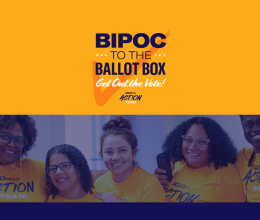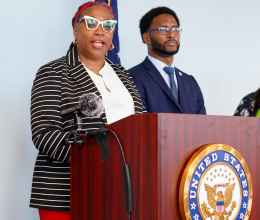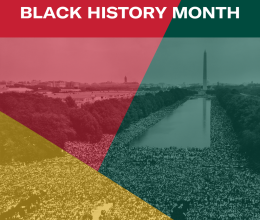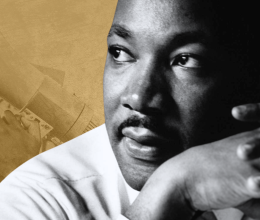
Juneteenth 2024: Celebrating the Past and Redefining the Future of Freedom in Massachusetts
By David Benoit, Racial Justice Community Advocate at the ACLU of Massachusetts
Growing up as a young Black boy in Massachusetts, the holiday Juneteenth was not part of my early education. For many Americans across the nation, Black history — especially recounts of Black triumph and liberation — is not always prominent in curricula. In some states, it’s even censored. The teaching of a Texas-born "Jubilee Day," now widely referred to as “Juneteenth,” is no exception.
Juneteenth commemorates June 19, 1865, a historic day of celebration on which the Union army arrived in Galveston, Texas and emancipated the state’s enslaved population — two years after President Abraham Lincoln issued the Emancipation Proclamation.
What has long served as the oldest known celebration commemorating the end of 246 years of legalized chattel enslavement in the U.S. is now also a federally recognized holiday, marking 159 years of Black freedom as of 2024.
As we approach the third federally recognized Juneteenth, we eagerly anticipate celebrating with communities throughout Massachusetts. But how do we properly commemorate the complex birth of emancipation that brought about new waves of racial prejudice and legalized discrimination through racist policies like the Jim Crow laws that followed?
Even as the ratification of constitutional amendments abolished chattel slavery, granted citizenship for the formerly enslaved, and granted African American men the right to vote within five years of the first Juneteenth celebration, political empowerment of Black individuals was and still is systemically restrained.
Here in Massachusetts, which holds a complex, yet rich history of antebellum abolition and Black organization, the ACLU of Massachusetts approaches Juneteenth with both joy for our Commonwealth’s journey towards freedom and recognition of our ability to further redefine what the future of freedom means for Black Bay Staters. True liberty, including dismantlement of racial inequity within our society, demands our undivided attention towards the troubles that our communities currently face — not least those that relate to voting rights and health care.
Voting Rights
Though some of the earliest “Jubilee Day” celebrations were used as education opportunities to inform new citizens of their right to vote, racist barriers to electoral participation during the Reconstruction era included the use of poll taxes, arduous literary tests, and dehumanizing political violence that followed Black Americans for generations, into the 20th century Civil Rights Movement and beyond. Today, one of the greatest threats to democracy is still voter suppression.
As we approach the 2024 election season, the ACLU — here in Massachusetts and nationwide — continues to work to defend our democracy, including by building Black political power. Together with partners in the Election Modernization Coalition, this legislative session we have proudly supported efforts in the state House and Senate to remove one longstanding barrier to ballot access by ending the punitive practice of placing voters on the “inactive voter” list for not returning the municipal census. Every election cycle, thousands of people are placed on the inactive voter list, preventing them from casting their ballot without showing proof of residency. This causes confusion and delays at the polls and disenfranchises qualified voters who do not have ID in hand. Requiring voters to jump through hoops to vote because of an unrelated administrative requirement has its roots in poll taxes from the 1800’s. It’s time to remove the obsolete obstacle, and the legislature finally has the opportunity to do so by embracing reforms proposed in the Senate budget.
But the ACLU’s work on voting rights isn’t just happening in the Legislature. As we honor the historic Black communities across the Commonwealth who bravely voiced their struggles against voter suppression and disillusionment this Juneteenth, we’re also uplifting the hopes, dreams, and demands of contemporary communities of color. And there’s no better time to join us.
Join the BIPOC to the BALLOT BOX team
Now in its second year, BIPOC To the Ballot Box is a powerful voter education and engagement initiative led by the ACLU of Massachusetts Racial Justice Program. Together with our Action Team volunteers and canvassers, we’ve knocked on thousands of doors and spoken with thousands of voters in cities and towns with large or growing communities of color. This includes those voters who are registered but don’t show up to the polls.
One of our primary tasks is to figure out why people feel so disengaged from the democratic process. What we’ve heard so far is that people care deeply about several issues, but don’t feel like their vote matters. One of those issues is voter suppression. Another major topic people raised is health care disparities, a problem with roots tracing back to the horrific legacies of the antebellum period.
Health Care
Across the U.S, racial inequities in our health care systems highlight longstanding failures to provide adequate medical treatment for Black individuals, particularly Black mothers. Dating back to the "Act Prohibiting the Importation of Slaves" issued in 1808, the intersection of medicine and Black health was manipulated by white slaveowners to perpetuate generational slavery across plantations.
Throughout this period, an estimated 50 percent of infants birthed by enslaved individuals were stillborn or died within the first year. At the same time, enslaved Black women and Black mothers were denied personhood and exploited as medical test subjects through experimentation, which was historically justified by racist notions of increased pain tolerance for Black bodies and exacerbated by a lack of legal protections for the enslaved.
These harrowing historical records cast a long shadow on the current realities of institutionalized medicine and its impact on the Black community today, especially found through recorded dismissals of pain and suffering for Black women within obstetric and gynecological sciences. We must eliminate barriers to equitable health care and acknowledge the socially embedded disparities within our health institutions, particularly concerning Black morbidity and infant mortality rates. This issue is especially important in a state like Massachusetts, which prides itself on a reputation of excellence in medical research and provision of care.
We know that restrictions on reproductive health care continue to disproportionately impact BIPOC people, and especially Black women and children. In Boston, for example, Black infants die at a rate more than double the citywide average — and more than three times as often as white infants. The ACLU of Massachusetts, including our Racial Justice program, advocates for the full spectrum of reproductive health care for all people, including birth choices that lead to racial equity and bodily autonomy.
As Massachusetts's legislative session ends, the ACLU and our partners are working hard to pass legislation to combat our state's maternal health crisis, including by providing critical access to birth centers and midwifery care. In recent years, the legislature has dedicated increasing attention to issues of maternal health equity, and we urge them to seize the opportunity of this Juneteenth season to enact comprehensive reforms.
For those formerly enslaved people in Galveston, “Jubilee Day” in 1865 heralded a new reality, a watershed moment of Black American history. This day marks the beginning of a new odyssey towards the birth of a culture defined by freedom, faith, and community — a life that many enslaved individuals dreamed of for generations. For me, Juneteenth 2024 symbolizes the potential for even newer realities, where we advance further in our ongoing fight against the disenfranchisement and systemic disparities our community has endured for far too long.
Join us in this pursuit, and stand alongside those who, like the trailblazers before us, have paved the way for our progress.
Happy Juneteenth.
Related content

Researchers Challenge NIH’s Politically Driven Grant Cancellations
April 2, 2025ACLU and NEA Sue U.S. Department of Education Over Unlawful Attack...
March 5, 2025
ACLU of Massachusetts statement on recommendations to reinforce...
October 16, 2024
Black History Month
February 1, 2024
Finding the courage to be change-makers in our communities
January 11, 2024
Finding the courage to be change-makers in our communities
January 11, 2024
The Free Expression Project
November 9, 2023